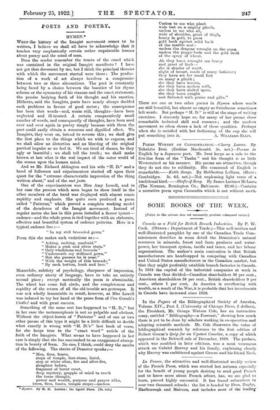POETS AND PORTR.Y.
HYMEN.*
WHEN the history of the Imagist movement comes to _be
writter4 I believe we shall all have to acknowledge that it teaches very emphatically certain rather unpalatable lessons about poetry and the mind of man.
Does the reader remember the tenets of the creed which was contained in the original Imagist manifesto ? I have not got that documentby me, but I think the principal theories with which the movement started were these : The produc- tion of a work ol art always involves a compromise between two or three alternatives. The poet is constantly being faced by a- choice between the beauties of his rhyme scheme or the symmetry of his stanzas and the exact statement, the precise bodying forth of his thought and his emotion.. Hitherto, said the Imagists, poets have nearly always deeided such problems in favour of good metre ; the consequence-
has been that words—and, woise still, thoughts—have been neglected and ill-treated. A certain comparatively, small number of words, and• consequently. of thoughts, have been used
over and over again in poetry simply because with them the poet could easily obtain a sonorous and dignified effect. We Imagists, they went on, intend to reverse this ; we shall. give the first place to the things which we wish to express, and we shall allow no distortion and no blurring of the original poetical impulse as we feel it. We are tired of shams, be they ugly or beautiful ; we shall tell the truth ; we shall make known at last what is the real impact of the outer. world, Of the senses upon the human mind.
And so Mr. Richard .Aklington and his wife "H. D." anda band of followers and experimenters started off upon their quest for the "extreme characteristic impression of the thing written about," and of the mot.juste.
One of the experimenters was Miss Amy Lowell, and in her case the process which soon began to show itself in- the other members of the band was displayed with almost comic rapidity and emphasis. She quite soon produced a poem called "Patterns," which proved a complete working model of the decadence of the Imagist movement. Instead of regular metre she has in this poem installed a.fiercer tyrant- cadence—and the whole poem is tied together with an elaborate, effective and beautiful system of cadence patterns. Here is a typical cadence line :— " In my stiff brocaded. gown." From this she makes such. variations as :—
"Aching, melting, unafraid." "Makes a pink and silver stain." "Only whalebone and brocade" "Underneath my stiffened gown." "But she guesses-he- is-near." "With the weight of this brocade." "By each button, hook and lace."
Meanwhile, subtlety of psychology, sharpness of impression, even ordinary nicety of language, have to take an entirely second place ; except metrically the poem is abominable.
The wheel has come full circle, and the completeness and rapidity of the return of all the old trouble are grotesque. It was nct wholly lamentable in result, however, as Miss Lowell
was induced to try her hand at the prose form of Can Grande's Castle? and with great success.
Something of the same sort has happened to "H.. D.," but in her case the metamorphosis is not so palpable and obvious. Without the object-lesson of " Patterns " and of one or two other poems of this type it might be a little difficult to decide what exactly is wrong with "H. a's." last book of verse, for she keeps true to the "exact word" article of the faith of the Imagists. What seems to have happened in her case is simply that she has succumbed to an exaggerated absorp- tion in beauty of form. No once I think, could deny the merits of the following. The statue-of Demeter speaks :— "Men, fires, feasts,
steps of temple,_ fore-stone, lintel,
step of white alter, fire and after-fire, slaughter before, fragment of burnt meat, deep mystery, grapple of mind, to-reach the tense thought, power and wealth, purpose and prayer alike, (men, fires, feasts, temple steps)—useless.
ilunien By H. D. London: the Egoist Item. [35. net.]
Useless to me who plant
wide feet on a mighty plinth,
useless to me who sit, wide of shoulder, great of thigh, heavy in gold, to press gold back against solid back of the marble seat : useless the dragons wrought on the arms, useless the poppy-buds and the gold inset of the spray of wheat.
Ali they have wrought me heavy
and great of limb—
she is slender of waist, slight of breast, made of many fashions ;
they have set her small feet
on many a plinth ;.
she they have known,
she they have spoken with, she they have smiled upon, she they have caught and flattered with praise and gifts."
There are one or two other poems in Hymen where words- are still beautiful, but almost as empty as Swinburne sometimes left words. But perhaps "H. D." is still at the stage of writing exercises. I sincerely hope so, for many of her poems show remarkable technical skill and resource ; and the modern movement so often shows a lack of these qualities. Perhaps when she is satisfied with her fashioning of the cup she will


































 Previous page
Previous page